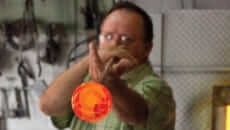One glassblower is romantic in art, but practical in business.

Chip Turner loves glass. The bright colors, the glossy finish, the magic of watching it take shape inside a kiln—he can wax poetic about the stuff for hours. But when he talks about his company, Appalachian Glass, he’s all business. “In the glass industry you have to constantly strive,” he says. “You’re competing with people all over the world, so you have to try to produce a product that is better or more affordable.” Appalachian Glass in Weston produces 500 products, from novelty pieces to stemware and drinking glasses, all made of hand-blown glass. They’re sold at stores in 37 states, the company does a brisk retail business at its shop, and the schedule at Turner’s glass studio is packed with demonstrations—more than 65 tour buses come through every year to browse the store and watch Turner and his team blow glass.
It might be the way Turner’s business sense mingles with his romantic ideas about glass that lends his business its special charm. His work is shown in a handful of West Virginia museums, the spiraled towers of glass lit with gallery lights, but he’s also not above making little glass trinkets that sell for $1 so even the most cash-strapped visitor can leave his shop with something small, like a colorful piece of glass in the shape of a chocolate kiss. “My thinking is that you shouldn’t have to have a lot of money just to buy a colorful piece of glass you enjoy—I don’t think rich people should be the only ones who can enjoy beautiful things,” he says. “But there’s a business side to that, too—having inexpensive things makes it easier to get them put in stores.” That said, nothing is too cheap. Turner does a full cost analysis before he introduces a new line of product, and he won’t keep producing something if it’s not profitable.

“In the glass factory there were hundreds of jobs to be done, and I spent all those years asking people why we do things a certain way, and they’d explain it to me,” Turner says. “I had this natural curiosity about the glass industry and that has really served me well. When you have a business you have to be a jack of all trades—you may be a master of none, but you have to know a little bit about how to do everything.” As the sole proprietor of Appalachian Glass, Turner is doing all the things he did during his years working his way through all those jobs at the glass factory—but now he’s doing them all at the same time. “Before I worked at keeping the plant running, developing products, and all of that,” he says. “Now I’ve got to wear those same hats again, but I also have to wear the marketing hat and I have to wear the production hat. I find myself blowing a piece of glass and thinking about all the other things I have to do and how I’m going to do them.”
Written by Shay Maunz
Photographed by Carla Witt Ford











Leave a Reply